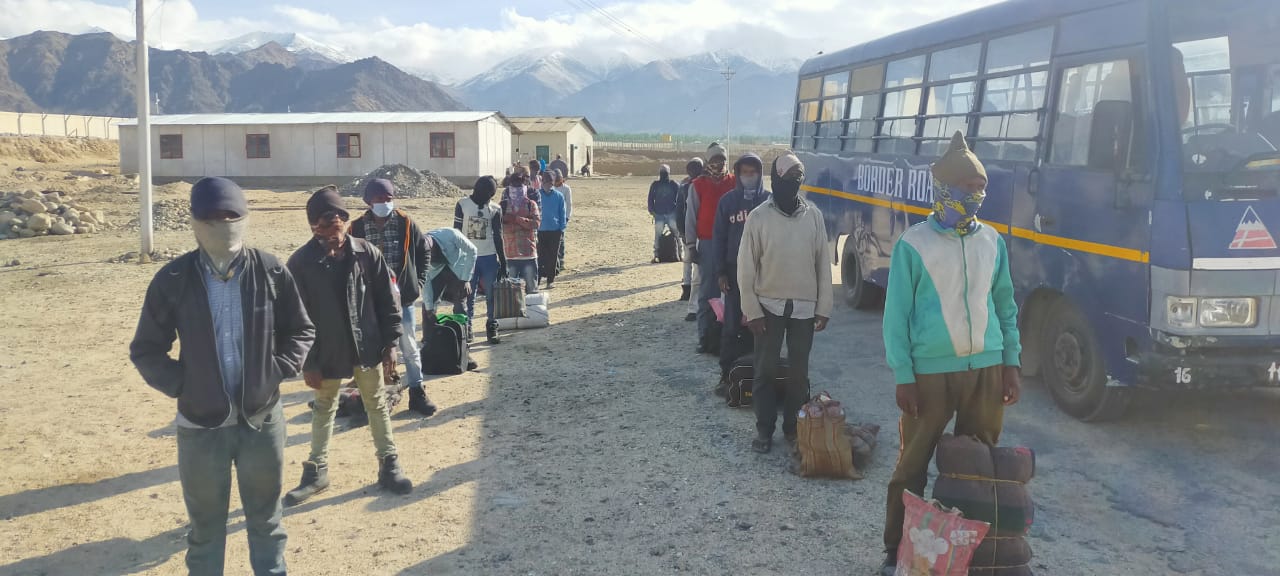Menedil, a 23-year-old young man from Dundiya village in Dumka district of Jharkhand, completed his college last year when his elder brother and father, both farmers, suggested he travelled to Leh in Ladakh for work. For the last many decades, villagers from Dumka have been travelling over 2,500 kilometres to work as ‘migrant’ labourers with the Border Roads Organisation (BRO) that develops and maintains road networks in India’s border areas.
“There isn’t any earning in farming, which can barely feed the family. So, I decided to go to Leh with other local men and earn some money for my family,” Menedil told Gaon Connection after he landed in Ranchi on June 8 morning, nine months after he had left home. “The agent, who took me to Leh for the BRO works, promised a monthly salary of Rs 10,000. It was a very harsh life there, as we had to work in snow and build roads in hilly border areas. Sometimes we were woken up at 2 or 3 in the night to clear the snow so that army trucks could move,” he narrated.
When Menedil left home, he had planned to work in Leh for three to four months only. But, because of the coronavirus disease (COVID-19) lockdown, he, along with several other ‘migrant’ workers from Jharkhand, was stranded in a remote area of Ladakh. It is only now, after two months of the lockdown, that the state government has started airlifting these workers at its own cost and bringing them home.
On May 29, in a first-of-its-kind airlifting of ‘migrant’ workers from within the country, Jharkhand brought its 60 workers back home from Leh. The very next day, 180 more were airlifted from Port Blair in Andaman & Nicobar Islands. On June 8, 55 workers, including Menedil, returned from Leh.
A total of 270 workers in Leh, Ladakh and 360 in the Andamans are being airlifted by the state government, informed an official.
“People from Jharkhand travelling long distances to work with the BRO is not a new phenomenon. It has been going on since the 1960s when the Border Roads Organisation was set up and the risk of war with China had dawned upon us,” Anu Sabhlok, an associate professor with the Indian Institute of Science, Education and Research Mohali, told Gaon Connection. Sabhlok, a social scientist, has closely tracked and researched on these ‘migrant’ workers who work with the BRO.
Despite of over five decades of service in nation-building by contributing towards the construction of roads and bridges in the difficult terrain of the border areas in the country, the role of these ‘migrant’ workers from Jharkhand has remained unacknowledged.
Rather, they receive a low monthly salary (Rs 10,000-15,000) with no other special allowances. The middlemen, known as ‘mates’, who help ‘recruit’ labourers for the BRO often exploit these poor villagers, many of whom belong to the tribal communities of the Santhal Pargana division in Jharkhand.
It is during the lockdown, when these workers were stranded and made repeated appeals to be brought home, finally leading to their airlifting from Leh, that the authorities woke up to their plight.
The state chief minister, Hemant Soren, has recently decided the BRO, under the Union Ministry of Defence, will have to sign a memorandum of understanding (MoU) with the state labour department before inducting any workers from Jharkhand. The MoU between the BRO and the state government, claimed to be the first-of-its-kind, will remove ‘mates’ from the scenario and ensure an institutional framework to safeguard the wages and other welfare measures for the workers.
It is only after the BRO gave an assurance in writing to sign the MoU with the state government that Soren has permitted the roads organisation to induct 11,815 workers from the state. In the future, the BRO also has to share registration, employment and benefit details of each inducted worker with a select high-level committee under the chief minister’s direct supervision. This is to ensure easy tracking of workers who work in extremely harsh conditions in the border areas.
2,500-km long journey
Last December, Amjed Ansari of Dudhani village in Dumka, left home to undertake his fourth journey to Leh to work as a road construction labourer with the BRO. Unlike Menedil, who had no clue of the harsh working conditions in the northern boundary of the country, Ansari was well aware of the risks as he had undertaken this 2,500-km long journey from Dumka to Leh three times in the past.
“Farming is not at all profitable and we can barely grow one kharif crop a year. I do not like going so far and working under extreme conditions of cold and snowfall, but I have a wife and two children to feed,” Ansari told Gaon Connection. He also landed in Ranchi on June 8 morning after being airlifted from Leh by the state government.
“My monthly earning in Leh was Rs 14,500, which was directly credited into my bank account. Most of that money I used to send home. So, when the lockdown was announced, I had no money with me to return home,” he added.
Apart from Leh where Ansari has worked with the BRO to build roads, he once also travelled to Arunachal Pradesh to build the border roads. “I did not like working in Arunachal as it used to rain heavily. So, I went back to seasonally migrating to Leh for work,” he informed.
In her joint paper, ‘Expeditions Along the Precipice: Circulations that construct India’s Border Roads’, Sabhlok writes: “Dumka district in Jharkhand has a long history of migration for road work. In the 1960s, when the Border Road Organisation (BRO) was formed with the mandate to secure India’s borders, Indian military officials scouted the poorer regions of the country for labour. The story goes that these uniformed officials would beat the drums at town crossings in Dumka, calling out to young, able-bodied men to join in this endeavour of securing the border.”
In the beginning, the Imported Casual Paid Labour, as the BRO called them, were given climate-appropriate clothing and the travel passes. At that time, Dumka was a district in the state of Bihar. However, as soon as Dumka became part of the newly- carved out tribal state of Jharkhand there was political resistance to ‘allowing’ labour to be recruited for work outside the state and the army stopped entering the state to recruit.
Yet, even in the absence of direct recruitment and the perks associated with it, the circulations of labour continued in their well-established routines. A system of labour gangs led by a ‘mate’ is in place, where the mate receives a letter from the BRO around April each year asking him to report to a particular road construction company with a specified number of men (usually forty per gang) by mid-May. The mate then starts his rounds of neighbouring villages, convincing young men to come along, notes Sabhlok’s paper.
Thus, the BRO has been inducting migrant workers from Jharkhand through these ‘mates’ who bring workers from Jharkhand to Leh-Ladakh, Himachal Pradesh and other border areas twice every year — April-May and then in October-November. However, the entire system is exploitative.
Despite statutory norms of the BRO to transfer fixed skill-based wage payment to workers, mates play the intermediary and migrant workers receive lower wages and face severe health conditions due to working in inhospitable conditions, said a state official.
However, the role of these ‘migrant’ workers in nation-building has been recognised by the BRO, which, in its recent letter dated May 31 to the state government, has noted: “Workers from Dumka and Deoghar districts have a long tradition of working for Border Roads and, over the years, their contribution to nation-building has been commendable … over the years [workers] have become a valued part of our seasonal workforce. The workers are honest, hard-working, tough and well-suited to work in the remote and rugged mountains.”
A first-of-its-kind MoU
After the first set of workers landed in Ranchi on May 29 from Leh, the state government realised the harsh and exploitative conditions under which these people work. A series of letters were shot off to the BRO seeking detailed information.
In its letter dated June 5, Rajeev Arun Ekka, the principal secretary of the Department of Labour, Employment & Training (Jharkhand government) informed the BRO that its workers had recently returned from Leh with “bitter memories and experiences”. Ekka also informed how these workers were “not receiving their appropriate payments through bank accounts and cheques as per wages fixed in the scheduled rate chart of the BRO” and the state government was “deeply concerned at this exploitation of the migrant workers”.
The letter went on to note the interest of the migrant workers were covered under the Inter State Migrant Workmen (Regulation of Employment and Conditions of Service) Act, 1979, which has no provision of ‘mates’ to take inter-state migrant workers. “This is in gross violation of the Act. This also opens the door of exploitation of poor tribal workers in the hands of middlemen and touts,” reads the letter.
“We are committed to the welfare of our workers and our tribal brothers have long served the nation and built its frontiers. We are ready to send our workers in the interest of national security, but will not allow any compromise of their honour, welfare rights, benefits and dignity,” said Soren.
To address both the issues of national security and exploitation of ‘migrant’ workers, the Jharkhand government has decided workers from the state will be inducted by the BRO only after the latter signs an MoU with the state labour department and does away with ‘mates’. The BRO also has to apply for registration as per the provisions in the Inter State Migrant Workmen (Regulation of Employment and Conditions of Service) Act, 1979.
In response, the BRO has recently communicated its revised scheduled of rates for all categories of workers — unskilled, semi-skilled and skilled, and has increased the wages by around 15- 20 per cent, which comes into effect from June 10 this year.
In its June 5 letter, the BRO has informed the state government it will undertake “recruitment of labour directly without the involvement of any contractor/mate” and “will sign an MoU with the State of Jharkhand after approval of MoU by Ministry of Defence”. BRO has also agreed to provide “clothing required for working at the place considering climatic conditions, medical facilities … accommodation.”
It is only after receiving these assurances in writing that the state government has permitted the BRO to directly induct 11,815 workers from the state.
But, are villagers like Menedil ready to again travel 2,500-km to work in Leh? “Haalat sab karwa deti hain, par ab main Jharkhand main hi kaam karonga [Circumstances make us do everything, but now I will work in Jharkhand only],” Menedil told Gaon Connection while he was in a bus taking him home from Ranchi to Dumka.
















